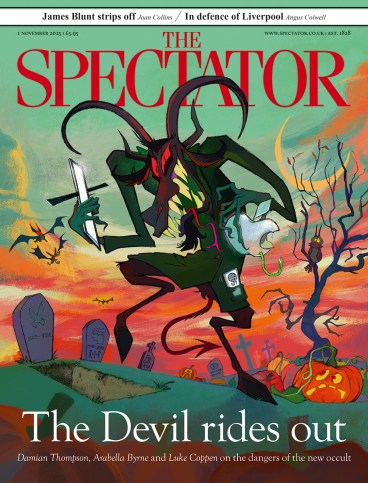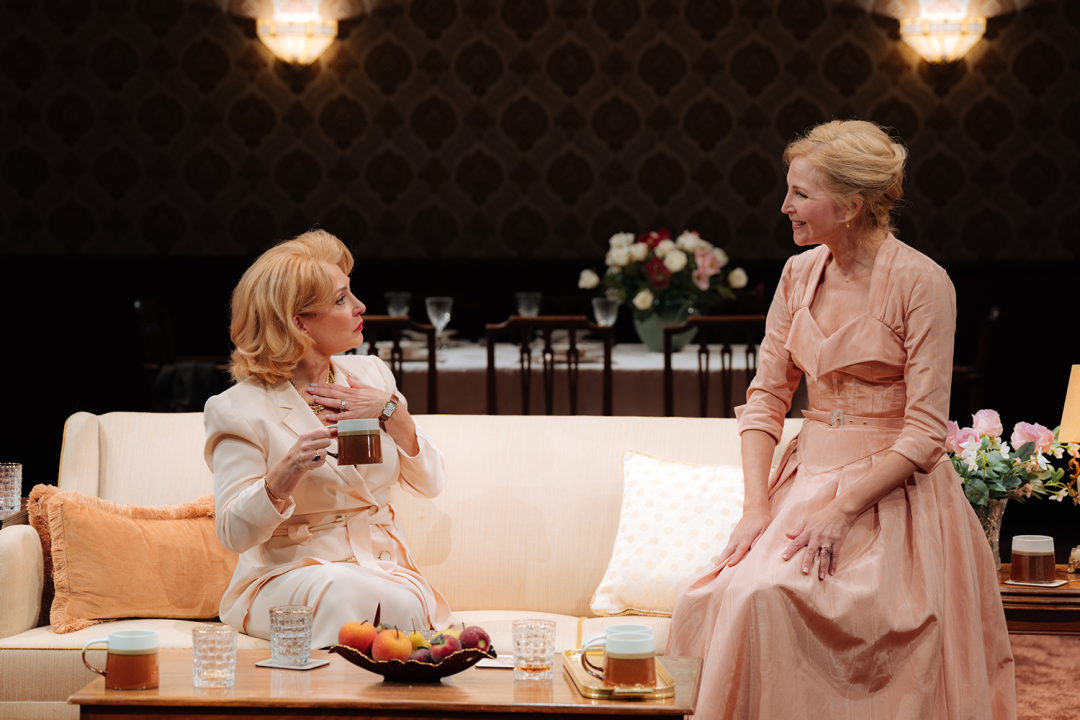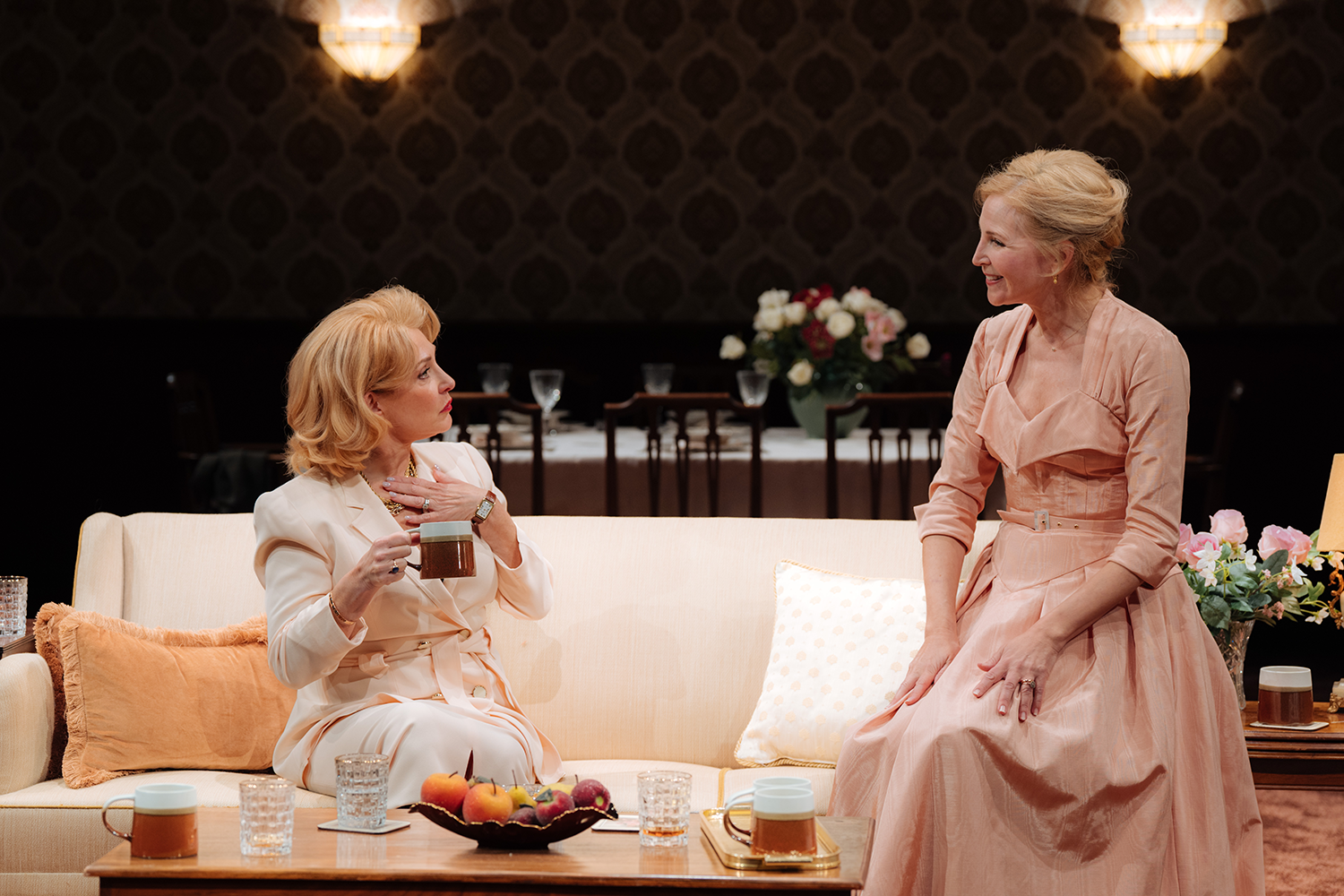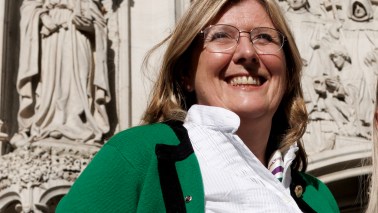
The Assembled Parties, by Richard Greenberg, is a rich, warm family comedy that received three Tony nominations in 2013 following its New York première. Hampstead has taken a slight risk with this revival. The cryptic title doesn’t suggest an easygoing drama full of excellent jokes. The Yiddish slang may be unfamiliar to English ears, and the social pedigree of the family needs explanation. These are wealthy New York Jews living in a 14-room apartment which they rent but don’t own, so their fortune is insecurely anchored. And the action starts in 1980 and fast-forwards to 2000 so it feels like a period piece aimed at the over-sixties.
Those drawbacks aside, the show is a sensation. Greenberg centres his tale on two sisters-in-law, Faye and Julie, whose husbands are more or less useless. The women approach life very differently. Faye is a sardonic hustler who meets every challenge with a double vodka and a vicious put-down. She despises the type of clingy grandmother who forces her sons to visit her every day. ‘The sense of neglect is the last to go.’
Tracy-Ann Oberman fits so snugly into Faye’s character that she seems to be playing herself. Superb naturalism. It could almost be a documentary. Julie (Jennifer Westfeldt) always smiles in the face of disaster and hides her anguish to avoid distressing other family members. Westfeldt’s instinctive grasp of this damaged, eccentric and big-hearted character is breathtakingly good. Blanche McIntyre’s direction brings out all the subtleties and grace notes of the piece. Faye complains about her brief phase as a beatnik when she went to a party but was ‘snubbed in person by e.e. cummings’. You seldom hear references like that in the theatre.
At its best, the show has the intensity and purity of a movie. When Julie tries to make peace with her younger son, Scotty, she holds his cheeks tenderly and asks him to look into her eyes. He doesn’t, he doesn’t, and then he does. This wordless exchange takes about ten seconds – a very long time on stage – but it reaches to the heart of their relationship. The audience shares their pain and their healing. At times, you want to get up and cheer because the theatre very rarely reaches these emotional peaks. The show’s dedication to accuracy extends to the late 1970s decor which seems deliberately listless and sad. The interiors are all muddy browns and dispiriting fawns. The thick shag-pile carpet looks like a beige lawn made of nylon. A fire safety officer would order its immediate removal. The only serious quibble with this show is that it’s in the wrong city. New York would adore it.
Faye is a sardonic hustler who meets every challenge with a double vodka and a vicious put-down
Little Brother, at Soho, is a flat-share drama about two thirtysomethings living in Belfast. Brigid is a chatty, good-natured civil servant. Michael is a cheerless and rather doctrinaire salesman. Neither character seems capable of doing or saying anything noteworthy. Why write a play about them? Not sure. They’re joined by Brigid’s depressed brother, Niall, who seems even duller than his brain-dead flatmates. Talentless Niall has no job, no friends, no intelligence and no ambition. He sits in the spare room strumming an electric guitar without skill or conviction.
The writer, Eoin McAndrew, has created huge problems for himself by choosing such bland characters. But he has a trick up his sleeve. Niall suffers from a mental health disorder that makes him automatically glamorous and fascinating to playgoers. Niall regularly scorches his arm with cigarette lighters and on one occasion added paraffin to make the flames burn brighter. When he visits the NHS he’s told that he must wait 12 months to see a counsellor. So his sister steps in and becomes his surrogate therapist. And although she has no qualifications, Brigid offers him excellent advice and support just by using her common sense. Perhaps therapists don’t need years of training. Their instincts are enough.
The play has fun mocking the NHS’s tyrannical bureaucrats who love completing forms but hate offering real help to victims. And the production conceals a shocking truth. A patient can overleap the 12-month waiting list by attempting suicide more frequently and with deadlier methods. The health service is effectively pressuring youngsters to harm themselves. This fact isn’t dramatised, just noted as an aside.
The play offers another useful insight into Britain’s mental health crisis. Niall finds work in a café and his neurosis vanishes instantly. He didn’t need a therapist. Just a career. The play won last year’s Verity Bargate Award and the production looks excellent. The various locations are suggested by four interlocking white cubes on multiple layers. Stylish but expensive. The performers, well directed by Emma Jordan, find as much comedy as the script can yield. The writer has sound instincts. Hopefully, he won’t repeat himself by creating another on-stage therapy session.









Comments